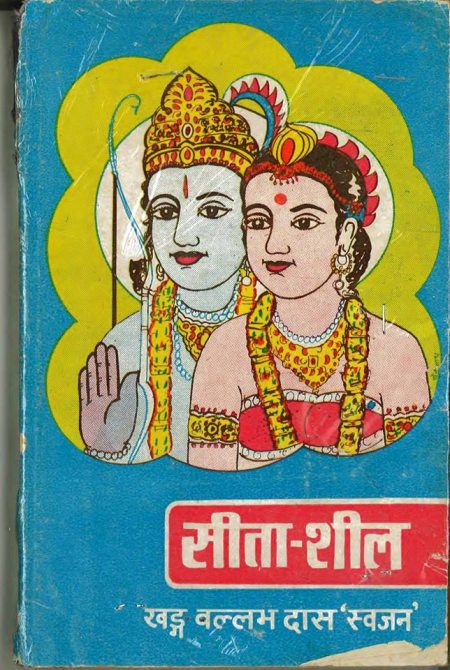“Seeta Sheel” is a maithili epic authored by (Late) Sh. Khadga Ballabh Das (Gram-Imadpatti, Madhubani Distt.). The 244 page hardcover edition was first published by Vidyarjun Publications in 1986. In 2013, with permission from Sh. Ramakant Das (Patna), Smt. Binita Mallik (Mithilangan, New Delhi) took the initiative of digitizing the book. The book is now made available for free online viewing by Google Books (Click here).
The book depicts the life, struggles and ideals of goddess Sita who is revered for her devotion in the Hindu mythology. The complete life story is presented in two-liner verses by Shri Das. Seeta, the legendary wife of Lord Sriram was born in ancient Mithila and spoke Maithili.
Shri Khadga Ballabh Das, a devout Hindu, completed authoring the poetic “Seeta Sheel” over several months following his voluntary retirement from the Government Press in Gulzarbagh Patna. He was known for his impeccable verse-authoring skills. The rhythm, word-choice and vocabulary he adopts in the book makes it a smooth, interesting read. The life-sketch of Seeta is based on TulsiDas’ Ram Charit Manas.
Shree Das was a mathematician, a poet and a war veteran. During the second World War he served in the British Army as an automobile technician; but developed a deep appreciation for the Indian freedom movement soon after. An excellent story teller, Shri Das was known for his dynamic cultural skills (such as conducting mathematics shows), social work, scientific experiments and, of course, literary works. Some of this dynamism is also reflected in the supplements to “Seeta Sheel” as book appendices. He devotes a page on depicting the god names in terms of numbers; and another on showcasing how a full poem could be written without using any “matras” (vowels) in Devanagri script.
During latter years of his life, Shri Das built a Shri Krishna temple in Imadpatti (Madhubani), his ancestral village. He enjoyed full support for his dynamic endeavors from his sons, Shri Lakshman Das and Shri Ramakant Das and daughter Smt. Vidya Devi and their spouses and families.
- Shri Khadga Ballabh Das (1909- 1999)
with wife Smt. Indramaya Devi (1912-1992) (Date unknown)



 What Wikepedia is to general knowledge, KavitaKosh is to Indian poetry. An unparalleled online repository of Indian poetry, Kavita Kosh was started by Sri Lalit Kumar and is now professionally run by a team which he leads. Sri Kumar is a poet himself and works in New Delhi. Kavita Kosh offers poems from Indian writers which are contributed by poetry-lovers. Above all, it is available in Devnagri script.
What Wikepedia is to general knowledge, KavitaKosh is to Indian poetry. An unparalleled online repository of Indian poetry, Kavita Kosh was started by Sri Lalit Kumar and is now professionally run by a team which he leads. Sri Kumar is a poet himself and works in New Delhi. Kavita Kosh offers poems from Indian writers which are contributed by poetry-lovers. Above all, it is available in Devnagri script.